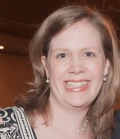July 2012 Newsletter

After careful risk analysis, Bethe Davis successfully negotiates a mud hole. Note the red safety vest even in off-road conditions.
President's Message by Bethe Davis
Can you imagine having to cover the cost of plane fare, hotels, and meals to send your new employees to Seattle to sit for the CPA exam? Recently, SB 98 came very close to making that a reality by taking away our future CPA’s ability to sit for the exam in our own state. This issue has stirred debate, controversy, and new interest in the privacy vs. security debate and risk analysis both in the workplace and out.
Our states have traditionally held the power to both define and legislate our “right” to privacy and to determine how far that right extends. It is incumbent upon us all to make sure our laws related to privacy and security are balanced with our needs economically and do not place Alaskans in a situation of competitive inferiority. The issue of biometric data regulation and legislation is not yet behind us.
Personally, I feel the whole issue of targeting fingerprinting at a test site as an invasion of privacy is ridiculous. I am more concerned about my credit card and social security numbers as “private”. As far as I know, as of today, about the only thing a digital scan of my fingerprints could do is uniquely identify me… serving the same purpose as a social security number or photograph has in the past but in a manner far less easy to duplicate or alter.
The social perception of having your fingerprints taken may have triggered the debate combined with a fear of data security, (which is different than a debate over privacy). Traditionally, fingerprinting has been associated with criminals and crime, but a digital scan of your fingerprints does not imply distrust.
Fingerprinting is required and is used in many areas of employment from police, emergency, child care, and security workers as well as many government jobs. All military personnel are fingerprinted as part of their identification. All of this is done to protect the public and provide identification - is digital fingerprinting as a form of identity fraud prevention in a testing environment so different? According to Prometric’s brochure, the fingerprints are fully encrypted before transmission and storage. As we understand it, measurements are taken between points on the scan; and those points are run through an algorithm that converts those measurements to a digital code that is stored in the system and matched to later scans. The information is of no use at all outside the system.
This issue is not closed. According to Lisa Rogers, chairperson of the AKCPA’s Legislative committee at a recent board meeting, potential legislation regarding biometric data collection and use is expected to reemerge later this year. The AKCPA’s legislative committee is currently looking for ways to better advocate and communicate our concerns to the public and to those in power. Items under consideration include finding candidates and students willing to testify that the burden of testing out of state would create an insurmountable economic barrier to obtaining a CPA designation for many Alaskan residents. The legislative committee is also looking to identify other groups whose testing with Prometric would be impacted to align our interests and concerns.
From discussions with Lisa, it is my understanding that representatives of NASBA, the AICPA and other national organizations are also interested in this issue and its eventual outcome. Alaska is not generally known as a front runner, but apparently is on the leading edge of debate on this issue. The spotlight is on us and has engaged the interest of other states as well as other organizations.
In my opinion, the risk lies in the security, monitoring, and use of the personal information including biometric data. Our state already has laws on the books regarding personal information use. House bill 65 was passed during the 2007-2008 session and was made law in 2009. The advocates of the of SB 98 and other citizens concerned with inappropriate use of personal information should perhaps seek to expand the Alaska Information Protection Act to protect its citizens from abuses related to all personal information rather than creating new legislation which targets only biometric information and may ultimately prevent some legitimate uses.
Whichever side of the debate you fall on, we know that the issue is not dead. Our voice was heard on SB 98 and we can expect to be called upon again in the future. The AKCPA’s legislative committee will continue to monitor developments and keep you posted. We encourage all of you to become better informed on this issue to be prepared to respond when called upon to do so.
For questions and comments: akcpa@ak.net
Alaska State Board of Public Accountancy Report
Melody Schneider, Board Liaison
The Board of Public Accountancy held an abbreviated meeting in Anchorage on June 26th ahead of the NASBA regional conference held in Anchorage from the 27th through the 29th. Several representatives from NASBA and the AICPA spoke to the Board about the support available through their organizations, and emphasized their value as professional resources. The meeting also provided the Board an opportunity to hear from the State Investigative Division.
Susan Winton, a senior investigator with the Division, gave a presentation on the investigative matters. The presentation included information on the investigative process, the imposition of civil fines for technical violations, probation monitoring, and a discussion on the matrix for fines. Additionally she answered questions from the Board and others in attendance on investigative matters.
A consent agreement or memorandum of agreement is an amicable settlement of a case that spells out disciplinary action between the Board and the licensee. Disciplinary actions defined in the agreement may include reprimand, assessment of fines, probation, requirement of additional continuing education, and in some cases suspension or revocation of the license. Once the Board signs a memorandum of agreement, the agreement becomes part of the public domain. The information is published on the Board website under the Investigative Reports button at http://commerce.alaska.gov/occ/pcpa.cfm.
Furthermore, the Society Board has approved to publish the information from the memorandums as a part of this report in the AKCPA newsletter, including the names of licensees specified in the memorandum, beginning with the next Board of Public Accountancy meeting (scheduled for August 9 and 10 in Fairbanks).
Spotlight on: Amy Bly Cooper

Congratulations to Amy Bly Cooper, our very own AKCPA President-Elect! Amy has been selected for the 2012 AICPA Leadership Academy! Amy will be the first Alaskan candidate selected to participate in this very prestigious training by the AICPA. We understand there is significant competition for the available seats and are excited that we are going to be represented by such a well-rounded, outstanding individual!
According to the AICPA’s website “the participants attending the AICPA’s Leadership Academy represent a cross section of the profession’s role in the American capital market system. Some work in public accounting and others in business, industry, government or academia”. Look for the press release soon!
Amy will represent our great state as an AKCPA board member, an accounting educator, a mother, and as a CPA experienced in public practice. Amy is an Alaskan transplant, born and raised in Birmingham, AL, she graduated from Birmingham Southern College in 2000 with degrees in Accounting and French. Amy worked for Arthur Andersen in Seattle while completing her master’s degree in Professional Accounting in Taxation at University of Washington. Amy has worked for both Walsh, Kelliher & Sharp in Fairbanks and F.M. Strand & Associates in Anchorage.
Amy began work for the University of Alaska Fairbanks as a full-time accounting instructor in 2009. Amy is mother to Oskar, 3, and Clara 1. Amy is currently on the Board of Directors for the Breast Cancer Detection Center and is the President-Elect for the Alaska Society of CPAs, having also served as a director and as treasurer. Amy is actively involved with the Great Alaskan Accounting People (GAAP), the student accounting organization at UAF and with their Volunteer Income Tax Assistance (VITA) program for students.
Congratulations again to Amy Cooper - 2012 participant in the AICPA Leadership Academy!
Get All Your CPE through AKCPA and
Our CPE Partners
If you are looking for a specific CPE topic that is not offered live by AKCPA, check out the AKCPA webcast partners at http://www.akcpa.org/cpe/. When you purchase a webcast through the AKCPA website, the Alaska Society receives a revenue share from your purchase.
We recently partnered with the California Society of CPAs Education Foundation to provide additional high-quality webcasts. The CalCPA webcasts are live and interactive and vary from technical to non-technical content. The webcasts range from two to eight credit hours. These webcasts allow you to participate from the comfort of your office or home, and there are hundreds to choose from. Go to http://www.calcpa.org/alaska for a full list of courses.
The AKCPA also offers webcasts from other top-notch sources to provide you with access to all the best webcasts in the country, including
- AICPA
- ACPEN
- CPA Crossings
- www.larrysteinonline.com
- Society Insight
- Surgent McCoy's Webcasts
- Rigos Professional Education
Get the information you need, and support your state society at the same time, by purchasing all your CPE and webcasts through the AKCPA website at http://www.akcpa.org/cpe .
Technology use in Alaskan CPA’s offices – the AKCPA Would Like to Hear From You!
I recently attended a webinar on cloud computing and it struck me that while the idea is pretty great on paper (pun intended), when getting down to the available software and applications, versions of applications and the costs associated (many of them on a per client basis), it became obvious this brand of cloud computing services was not the answer. It seemed like there is still a lot of beta testing to be done before we are going to be ready to jump fully to the cloud. This is not a unique experience, when reading the array of sales pitches and articles regarding many of the “latest” technology uses it may seem like many firms are successfully incorporating technology to the fullest, but when I query other Alaskan CPAs, the reality seems pretty different than what the media would have us believe.
Just how far are Alaskan CPA’s really leveraging technology in their practices? The AKCPA would love to hear from you – please take a minute to review our questions and respond. For those of you out there who are early adopters please let us know if you would be available for interview or additional comments on your experiences for a later newsletter publication (or wish to keep your comments anonymous).
- Are any practices fully or partially on the cloud? If the answer is yes to partially- what sort of applications are you still keeping “in house” and what is cloud based? How long have you been on the cloud? What are some of the best things about the cloud for you?
- We see a lot of information on software and applications for meetings between multiple locations including free applications for “face to face” such as Skype … are any practitioners using “face over internet” or other internet meeting types of communications regularly for their clients or staff? If so, what is your take on the pro’s and cons?
- How many of you have a policy in place that dictates or limits the use of company data and resources subject to remote access from hardware such as smartphones, I pads and work from home machines? Do you have acceptable use policies on company provided hardware? Do you have “wipe access” as discussed in this month’s JoFA article?
- How many of you have social media policies in place for employees? Is anyone using social media as a firm for client communications? If not, are you considering it?
- How many practitioners use webinars extensively for training? (If you said yes – did you know you can get many of the same titles through the AKCPA and help us in the process?) Are you seeing good results for webinar based training? How does it stack up to in-person training in your opinion?
- Do you have any strictly work-from-home employees or are you a work from home employee? What are your pro’s and cons? Does anyone have any employees that exclusively work from other locations?
- Has anyone tried data recognition and form population software for tax preparation? If so what was the experience like?
We would love to hear from you! Please take a minute to take a look and respond to any or all of the questions. Send your comments to: akcpa@ak.net and thank you for your support.
ATTENTION FUTURE CPAs
What would you say to a program of scheduled study time with a focus on items most likely to be on the exam with PROVEN RESULTS?
Only Becker offers a comprehensive, integrated review course that mirrors the content and functionality of the CPA exam in every way. Becker's learning approach allows you to progress efficiently through our CPA Exam Review, maximizing your study time and giving you the greatest chance of passing the CPA exam.
The Becker CPA Review course is prepared by authorities on the CPA exam, giving students the benefit of their comprehensive experience and knowledge. Local lecturers contribute additional support during the concentrated study. The course includes detailed study material for every part of the exam, as well as specific test-taking techniques. Sample CPA exam questions, including simulations, and in-depth explanations are provided in our computer-based study guide! Candidates outside of Anchorage can use the self-study materials, but still have access to the local instructors. Classes begin soon so check the schedule at www.Becker.com and Prepare for Success.
AKCPA members get $295 discount off the full four-part course tuition. Call Jacque Briskey at 694-0105 today for special Alaska pricing and to register for the upcoming classes.


